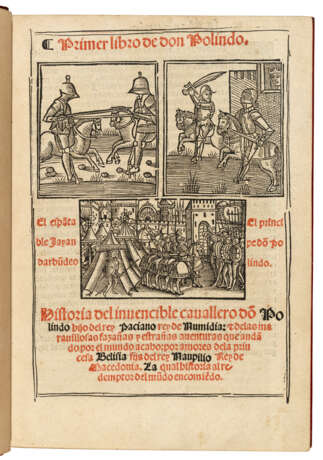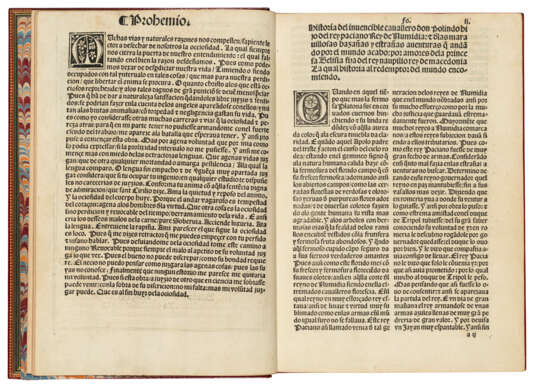ID 870731
Lot 117 | DON POLINDO
Estimate value
£ 20 000 – 30 000
Primer libro de don Polindo, Historia de invencible cavallero don Polindo. Toledo: [Miguel de Eguia], 10 April 1526.
First edition of one of the rarest Spanish chivalric romances, the only copy on the market in almost a century, and one of only 7 copies recorded. The eponymous Don Polindo was the son of King Paciano of Numidia. Kidnapped as a child and raised by fairies, Polindo is presented at his father’s court to be knighted. His adventures take him throughout Macedonia, where, among many obstacles he overcomes, he battles Darbundeo for the love of Princess Belisia. A sequel is announced but never appeared. Polindo was long (erroneously) considered to be part of the Palmerine cycle, due to conflating the main character with Polendos, half-brother of Primaleon. The last copy on the market was the present one, in 1936. Palau records another copy sold by Maggs in 1934. Six institutional copies [Munich, Chicago, London, Barcelona, two at Lisbon] are recorded, two of which are imperfect (British Library, one at Lisbon). Palau 230331. Heredia, no. 2491 (imperfect); Perez Pastor, Lalmprenta en Toledo (1887), no. 132 (describing an imperfect ‘unico ejemplar’ with Boone of Bond St., London); Brunet IV, 777 (‘très-rare’); not in Salva.
Folio (249 x 176mm). Title printed in red and black, 3 woodcuts on title, woodcut ornamental initials (washed and pressed). Crimson morocco gilt, sides paneled with fleurons at corners, spine gilt and lettered, pastedowns of blue crushed morocco, marbled endleaves, edges marbled and gilt, by Motte (lightly rubbed at extremities). Provenance: [sold Maggs cat. 621 (1936)] – José Mindlin (1914-2010; bookplate).
Special notice
No VAT on hammer price or buyer's premium.
| Place of origin: | Europe, Spain |
|---|---|
| Auction house category: | Printed books |
| Place of origin: | Europe, Spain |
|---|---|
| Auction house category: | Printed books |
| Address of auction |
CHRISTIE'S 8 King Street, St. James's SW1Y 6QT London United Kingdom | |
|---|---|---|
| Preview |
| |
| Phone | +44 (0)20 7839 9060 | |
| Buyer Premium | see on Website | |
| Conditions of purchase | Conditions of purchase |





